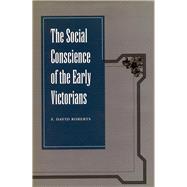
Note: Supplemental materials are not guaranteed with Rental or Used book purchases.
Purchase Benefits
Looking to rent a book? Rent The Social Conscience of the Early Victorians [ISBN: 9780804745321] for the semester, quarter, and short term or search our site for other textbooks by Roberts, F. David. Renting a textbook can save you up to 90% from the cost of buying.
| Introduction | p. 1 |
| The Tradition of Paternalism | |
| The Idea of Paternalism | p. 9 |
| Paternalism Made Popular | p. 28 |
| The Practice of Paternalism | p. 44 |
| The Vision of a Laissez-Faire Society | |
| The Triumph of Political Economy | p. 75 |
| The Impact of Political Economy | p. 92 |
| Sacred Property and Divine Providence | p. 113 |
| Self-Reliance | p. 139 |
| Voluntarism | p. 183 |
| Basic Attitudes | |
| Philanthropy | p. 229 |
| Humanitarianism | p. 258 |
| The Sources of Humanitarianism | p. 296 |
| Vested, Class, and Self-Interest | p. 332 |
| The Role of Government | |
| Government a Vast Evil | p. 375 |
| The Inexorable Growth of Government | p. 396 |
| The Idea of a Paternal Government | p. 414 |
| The Idea of a Utilitarian State | p. 433 |
| Conclusion | p. 457 |
| M.P.'s of Religious and Rationalist Outlook | p. 469 |
| Notes | p. 471 |
| Index | p. 547 |
| Table of Contents provided by Syndetics. All Rights Reserved. |
The New copy of this book will include any supplemental materials advertised. Please check the title of the book to determine if it should include any access cards, study guides, lab manuals, CDs, etc.
The Used, Rental and eBook copies of this book are not guaranteed to include any supplemental materials. Typically, only the book itself is included. This is true even if the title states it includes any access cards, study guides, lab manuals, CDs, etc.